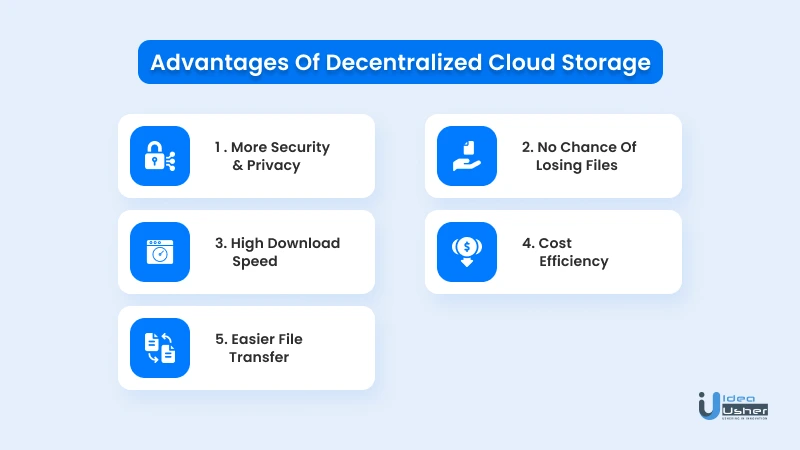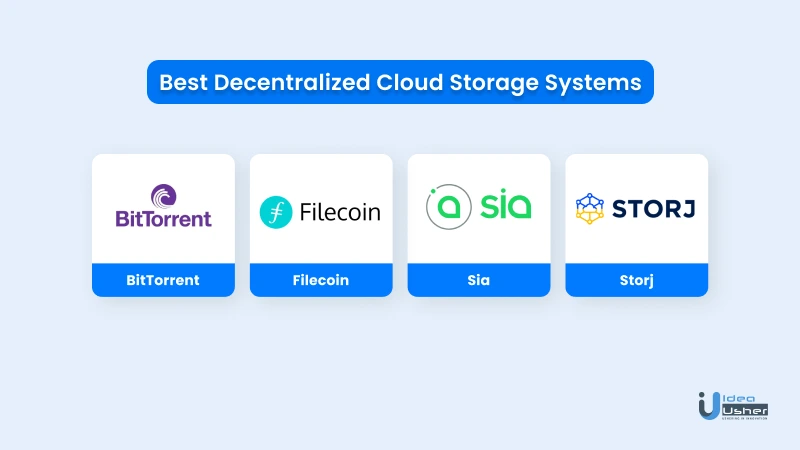
Due to limitations and many restrictions within centralized cloud storage platforms: users are moving towards decentralized cloud storage.
Many entrepreneurs are aware of this ongoing situation which encourages them to enter this market by launching their innovative and advanced decentralized cloud solutions.
You can learn about this new type of cloud, its benefits, and business potential from this blog.
What is decentralized cloud storage?
Let’s first talk about the centralized cloud. Many big brands offer this kind of service, like Dropbox and Google Drive, as it needs huge investment and space to set up.
Central computing resources are kept in one place. At the same time, in the case of a decentralized cloud, it is distributed all over the place among its blockchain member using their computing resources.
The thing that most matters about the centralized cloud is its file location. For accessing data in this storage, you’ll need to know its location over the server, i.e., its web link.
But here are a few drawbacks of centralized cloud services:
- There is a high hosting cost in centralized storage.
- It has less data transmission speed.
- There are more security risks in centralized storage.
- The hosting provider can control or manipulate users’ data.
- In case of shifting data to the new cloud server, every user will need a new web link to access the data at the new location.
While in the case of decentralized cloud, these drawbacks can be removed. It stores the user’s data over decentralized networks by encryption and other data practices. The decentralization lets users access their data from anywhere.
Decentralization in the cloud makes the users’ data uncontrolled by any centralized party, making their data more secure and accessible. The data gets stored on all the computers connected to the specific blockchain network, such as Ethereum and other blockchains. But, there are more benefits that users get from this decentralized cloud platform.
Why do users prefer decentralized cloud storage?

So, what are the reasons that make users choose decentralized cloud platforms?
Let’s discuss the benefits of this storage over centralized storage to help you understand why decentralized storage is best for your business.
1. More security & privacy
The storage provider gets the right to do anything to users’ data in centralized storage. It can be manipulation, removal, theft of data & so on. Also, it leaves more potential threats for cyberattacks by hackers and competitors.
The best way to remove all these problems is to shift to a decentralized cloud. The data encryption on these servers makes users’ data more secure and private over the decentralized network.
2. No chance of losing files
There are countless copies of users’ files over the decentralized network as their files will get stored on all the different nodes on that specific blockchain. So even if there is a data transmission error on particular nodes, the users can still access the data from the various nodes over that blockchain.
3. High download speed
Centralized storage has limited computing power to manage massive traffic. At the same time, that’s not the same case for decentralized storage. It consists of countless nodes that work on peer-to-peer technology, making more computing power available. Which allows users to access their files quickly. Also, fewer restrictions on file transfer in blockchains allow files to transfer at higher rates over these decentralized networks.
4. Cost efficiency
No limits are applicable to the number of computers connected to a specific blockchain for contributing to providing computing power and storage. The number of these nodes is increasing day by day as the member of particular blockchain networks are getting more benefits like earning passive income by connecting to it.
5. Easier file transfer
Users find it easy to transfer files to a decentralized cloud over centralized storage. There are many reasons for easy transfer due to having more available & better computing power, users can access their files without needing a web link. Also, it has fewer restrictions on file transfer.
You can learn about its works in the next section to understand it even better.
How does decentralized cloud storage work?
You can understand the working of a decentralized cloud platform well by knowing the system process when uploading and downloading files over the decentralized network. Let’s start this section with files uploading.
I. Saving files on blockchain servers
The system working has three stages, i.e., file encryption, file splitting, and file distribution. Let’s discuss them all in detail:
File encryption
Whenever you upload data to the server, every bit of your file gets automatically encrypted for its security and privacy. The part of your files gets decrypted when you submit a request for data access on that blockchain server without needing any private keys or specific permissions. Different servers use their own preferred encryption/decryption methods for file storage and access.
File splitting
After the file encryption, the data gets split into smaller pieces, and each piece is non-recognizable from another piece. Each file object comes into 80 pieces, and each piece saves in separate computers at different locations. For accessing these encrypted files, a minimum of 29 parts of that file get split. Splitting makes it secure as no one can access that file without the owner’s permission.
File distribution
The file is now ready to be distributed globally after its encryption and splitting. That means users’ entire files will not be on a single system. The blockchain network chooses the nodes for the file distribution, making the user’s file even more secure.
II. Downloading files on the blockchain
There are a few steps involved when downloading files from non-centralized cloud platforms.
- The pieces of encrypted files taken out from their nodes
- These collected pieces join into a single file
- The piece of the encrypted file gets decrypted
- The file is ready to get downloaded on the users’ system
There are many best platforms available that you can check in the next section.
The best examples of decentralized cloud storage.

Take a look at some best cloud platforms. It will help you know about its services and how its business model works and makes money.
There are many best examples, but we have picked only the top best products that are enough for your research on decentralized cloud products.
1. Bittorrent
It is one of the oldest platforms. Almost everyone has used it once in their lifetime to download free games, movies, and even software. It was founded in 2001 and is well known for uploading and downloading pirated media.
2. Filecoin
Filecoin is a P2P network service well known for its one of the ever-largest initial coin offerings. It uses its cryptocurrency, “FIL,” to provide storage services to which users pay FIL to store their files on this platform.
It is an open market that offers great flexibility for using its benefits in terms of pricing and using its resources. The only downside is that it only supports Linux and macOS, but not windows.
3. Sia
It uses a peer-to-peer mechanism for file storage and a marketplace for hosting applications. It distributes the file segment to all its different nodes worldwide to eliminate a single point of failure, as that mostly happens in centralized storage.
4. Storj
It provides decentralized network infrastructure for sharing and hosting files on its cloud servers. Storj offers a fixed pricing structure. It comes with two different products: Storj and Tardigrade.
Stoj works on the supply side, while Tardigrade works on the demand side. Its free plan comes with 150 GB of storage, while its pro plan costs $4 per terabyte.
Now you may understand how profitable it is to enter this market. If you decide to make your storage platform. The next section will definitely help you.
How can you create decentralized cloud storage?
Once you know how profitable it is to make your decentralized cloud after looking at its market size. It can be your wise decision to enter the market by creating your storage platform for users. But what are the ways to make this? Let’s discuss it in detail.
Creating a decentralized cloud by yourself can be a tough challenge. It needs a team of experienced developers to make and publish a decentralized cloud platform. Hiring app developers to make your cloud platform makes excellent sense.
Let’s look at the following tasks developers will perform for making your project:
- UI/UX – to design and develop the UI
- Networking – for building the P2P network;
- Encryption – for data masking
- Database management – for storing and accessing files
- Blockchain decentralized apps (DApps) and smart contracts – to create the decentralized framework
Now moving to the end of this blog.
Let’s conclude!
Starting something new in the tech market can increase your chances of having a successful business. Moreover, due to the expansion and success of blockchain technology such as NFT, crypto coins, metaverse, and so on, it makes sense to start something related to these decentralized markets.
Creating your decentralized platform by blockchain development for your customer can be the best option for you, and it is the perfect time to start this due to less competition and more potential.
You can hire a development team for your project; even better, you can contact us to start your business.
Frequently Asked Questions
Check out some questions and their answers to clear your doubts. Even if you still have any doubts regarding this business, you can contact us to get free guidance on your project.
1. What is the meaning of “decentralized” in cloud storage?
This word refers to the term “decentralized computing .”This system allocates its resources, such as computing power and storage, to each computer involved within a specific blockchain.
2. How many types of cloud storage are there?
There are four types of cloud services
- Public cloud
- Private cloud
- Hybrid cloud
- Community cloud









Gaurav Patil